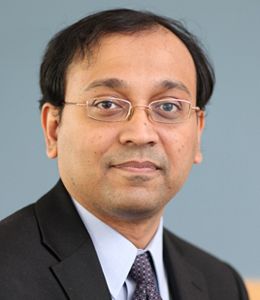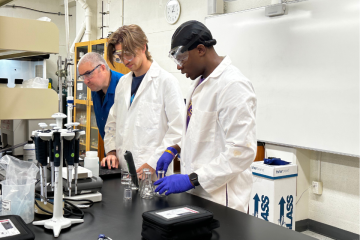Chemical Engineering Faculty Awarded National Science Foundation Grant

Dipendu Saha, an assistant professor of chemical engineering, received a two-year grant of $100,000 from the National Science Foundation to develop a novel material that will recover two rare-earth elements, neodymium and dysprosium.
The funding comes from the Early-Concept Grants for Exploratory Research (EAGER), an exclusive award given only to projects with dramatically different approaches that demonstrate potential for high-risk, high pay off results.
“Rare-earth elements are critical components found in tools and devices that we use daily, such as computer hard drives, green technology and televisions,” said Saha.
With this grant we will research an innovative strategy using a novel approach to recover these precious metals from products at the end of their useful lives. —Dipendu Saha
Rare earth elements are a group of chemically similar metallic elements found in the earth’s crust. These elements are used in a number of important applications such as electronics, cathode ray tubes, optical devices, permanent magnets, power sources and various military applications.
These elements are described as rare not because of their limited amount – they are abundant in the earth’s crust – but because of the difficulty associated with extracting them in sufficient amounts. Due to the fact that the elements are not concentrated into large deposits, they can often be mixed with other metals making them hard to separate.
Adding to the difficulty, more than 90 percent of the world's supply of these metals is controlled by foreign countries. Recent export restrictions have led to an interrupted supply of the metals to the United States, and raised concerns about their continued use in military and energy capacities.
“This research is critical for two reasons. First, it will create a new tool that will help reduce the U.S. dependency on foreign countries and establish economic independence on the valued rare-earth elements. Second, a more efficient and environmentally friendly tool will be a welcomed replacement for the existing outdated and environmentally hazardous technology,” said Saha.
The grant will support student research for undergraduate and graduate engineering students. Over the next two years, Saha and his team of student researchers will explore a new recovery method for two specific rare-earth elements through the use of DNA grafted mesoporous carbons. Currently, rare-earth elements are recovered using solvents. Solvent extraction, however, can be hazardous, expensive, time and labor intensive, and ineffective when the metals are found in low concentration.
Saha anticipates the outcome to result in a series of highly adjustable and stable DNA grafted carbons that can substantially enhance the uptake and recovery of neodymium and dysprosium compared to currently available methods.




